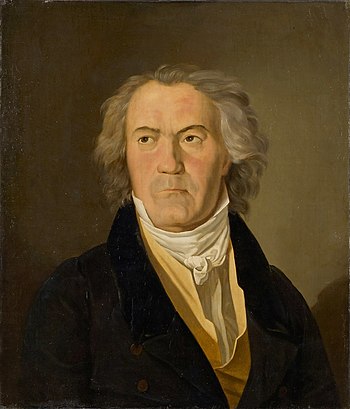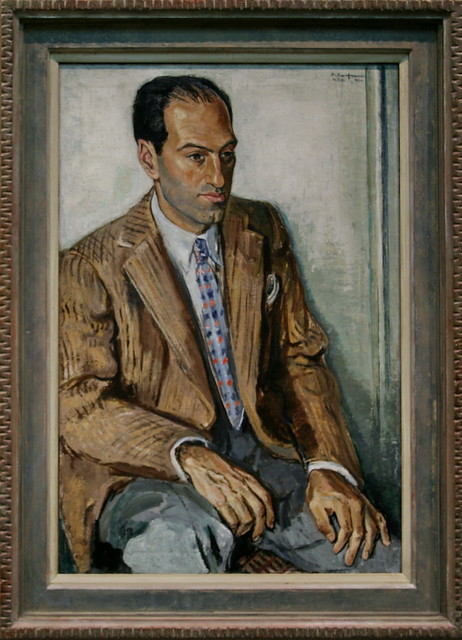 |
| Puccini (Photo credit: Wikipedia) |
Giacomo Puccini was born on December 22, 1958. His hometown was Lucca, Italy, a charming town in Tuscany surrounded by Roman walls. His family had a long lineage of musicians and he soon became an organist at a local church. He was inspired to write opera after seeing a production of Aida. He had to walk almost twenty miles to Pisa to see it. It is fitting that Aida was his inspiration. Written by the current reigning king of Italian opera, Giuseppe Verdi, it marked a turning point in that composer's musical language in which he started broadening his horizons eastwards- towards German specifically and Richard Wagner. Puccini would continue to both embrace Italian style but expose himself to the musical language of the Germans, French and new sounds that were coming out of the Orient.
It is also very fitting that his first successful opera, Manon Lescaut, was written in 1893. That happened to be the same year that Verdi wrote his last opera, Falstaff. Although Falstaff is unquestionably a masterpiece, listeners of the day must have found it to be somewhat old-fashioned after hearing Manon Lescaut. Puccini takes the story of the courtesan and creates voluptuous sonorities. He employs new instruments and chords not to mention a compelling sense of drama.
Manon Lescaut now behind him, he turned to a story by Murger about a bunch of bohemians. Written in 1896, La Boheme would become one of the most popular opera ever. It was revolutionary in its day for the naturalness in which the characters spoke. Instead of gods and goddesses, these characters dealt with banal issues such as paying the rent. In other words real life. This was a part of a movement in Italian literature called verissmo. (I pagliacci and Cavalleria rusticana are other examples.) Boheme was lauded for its musical language and its gripping theater. The story is about a seamstress who meets a young poet and embarks on a love affair despite knowing that she is dying of consumption. Although many find the Broadway musical Rent to be a bastardization of this opera, it is an effect updating because T.B. was a very stigmatized disease in its day much like AIDS was in the 80s.
in 1900 Puccini wrote Tosca a bloody opera about corruption and abuse of power. The opera comes from a play by Victorien Sardou written specifically for the legendary actress Sarah Bernhardt. The character of Tosca seems a good fit for any prima donna because, in part, it is about a prima donna. Puccini at this point was becoming interested in the new sounds that came were coming out of France at the time, notably orientalism. In an opera that takes place in Rome, he had almost no opportunity to use it in a credible way. The did manage to insert a whole tone scale, a sequence of notes that is now a cliche for Chinese music.
He had no trouble incorporating orientalism in his next opera, Madama Butterfly. Written in 1904 the premiere was one of those legendary disasters that can only happen in opera. The public didn't seem to want to give it a chance. It may be apocryphal, but the story goes that Arturo Toscanini was both conducting the premiere and having an affair with the soprano. In act II when Butterfly brings out the illegitimate son she had by Pinkerton, the American soldier, a heckler screamed out "It's Toscanini's." Needless to say, there was no way to restore order after that. Puccini went on to revive it twice in the ensuing months and its final version has become a beloved favorite. Hearing the original version it is plain to see that it is flawed. It is a testament to Puccini's humility that he would take that disaster and try to examine how he may have failed as a composer and try to improve his work.
His last major premiere was Turandot. Taking place in mythical China this was the perfect opportunity for him to explore new sounds and create atmosphere. The story centers around an icy princess who has a penchant for decapitating her suitors. One eventually wins her over and they live happily ever after. Dramatically the work is flawed but in terms of glitzy theatrical spectacles, there is nothing better. It includes the great tenor opera "Nessun Dorma." Puccini never completely the opera. The task went to Franco Alfano. Toscanini was disappointed with it and revised his version giving us what we recognize today.
Puccini dies in 1924. A chronic chain smoker, it was throat cancer that did him in. It is ironic that someone so devoted to the human voice should die such a way. The passage of time has not diminished the immediacy and timelessness of his operas.
Sammy Higgins lives in New York where collects opera CDs. Article Source: EzineArticles |


















